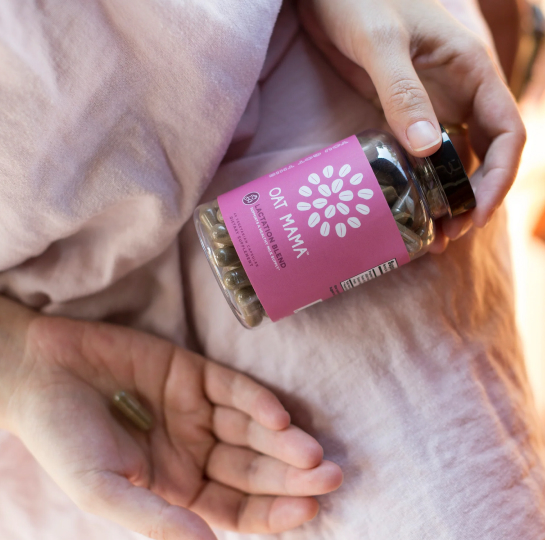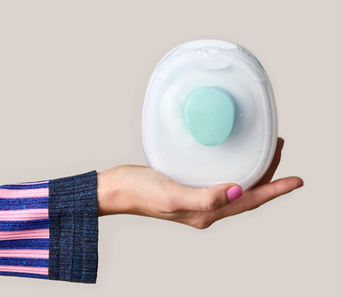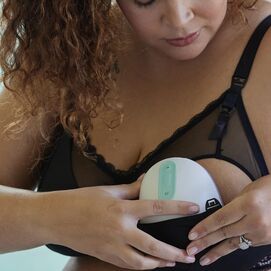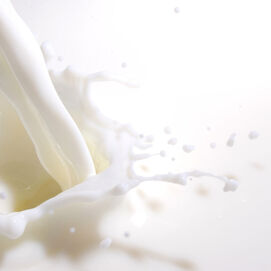Hey mama, if you’re worried that your baby isn’t getting enough nutrients, you are not alone! It can be tricky determining whether or not you’re producing enough milk, and whether or not it’s time to try breastfeeding supplements. Supplements aren’t for every new mom, but they can be helpful under the right circumstances. Keep reading to learn when breastfeeding supplements are necessary, and what you need to know before trying them.
What are Galactogogues?
Galactagogues are defined as synthetic or plant molecules used to stimulate or increase milk production. Galactagogues can range from foods, herbs, to drugs. These supplements often contain nutritious vitamins and minerals that are known to support breast milk production.
It’s important to remember that experiencing a drop in milk supply is completely normal, and using a galactogogue may not be your first step to try to stimulate milk production. Tell your doctor if you are experiencing a sudden drop in milk supply, but know that there are plenty of options to help get you back on track.
Oat Mama Lactation Supplement
Oat Mama Lactation Supplement
Oat Mama's proprietary blend of galactagogues (milk-boosting herbs) includes alfalfa, goat's rue, milk thistle, moringa, shatavari, and spirulina. Plus it's gentle on the tummy.
Do Lactation Supplements Really Work?
During lactation, you have several hormones working at full capacity to produce nutrients for your baby while simultaneously keeping your body healthy. The most common reason lactation supplements are used is for a decrease in milk supply, but the reality is that a milk supply decrease can be caused by several different factors. Because of this, much of the research is anecdotal on whether lactation supplements really work.
Despite this, recent studies have shown that new moms around the world have relied on galactagogues and have found them to be effective. One recent study found that 75% of the women in their sample experienced positive effects from fenugreek, a notorious and ancient galactagogue herb. Another recent study tested 122 new mothers and found significant results that fenugreek can play a role in milk production.
Oat Mama Lactation Tea
Oat Mama Lactation Tea
Caffeine-free and artfully blended with the best organic, milk-boosting herbs to support a healthy supply on your pumping and nursing journey.
When To Take Lactation Supplements
Because lactation supplements are often taken for the purpose of stimulating or maintaining milk supply, be sure to check for other reasons why you think your breast milk might be low. It’s often easy to worry that your baby isn’t getting enough nutrients, when you are really producing the right amount! Know that your breast milk has all the nutrients your baby needs, and you will learn how to tell when your baby is getting enough milk.
After speaking with your doctor about increasing your milk supply, you can choose to make an informed decision on the type of lactation supplement you want to take. Remember that results don’t happen overnight, and depending on your supplement or dietary change, it may take a few days for your body to adjust. Stay on a strict regimen to see results quickly.
Supplements to Avoid While Breastfeeding
There are plenty of healthy lactation supplements to learn more about, but there are also a few to avoid! Some supplements can actually inhibit breast milk production.
Sage
If you’re working on increasing your milk supply, sage will not do the trick. Sage is a known supplement for reducing breast milk production, and can be used to help during the weaning period with your baby.
Peppermint
While drinking some peppermint tea shouldn’t be a problem, consistently eating peppermint can decrease your breast milk production. Peppermint oil can be used all over the body, but there are results showing that it can adversely affect milk supply.
Essential Oils
Not only can what you put in your body affect your milk production, what you put on your body can have similar effects. Various essential oils that are diffused or applied to your skin have proven to be dangerous for new moms when it comes to breast milk production. Using scent-free, gentle products in your home and on your body is a best practice during pregnancy and breastfeeding.
Whether you take breastfeeding supplements or decide to try other methods, make sure you are making informed decisions and have spoken with your doctor first. Have more questions about breastfeeding or pumping? Visit the Willow blog to get advice from our experts
Medically Reviewed by: Dr. Michele Torosis, M.D.
Dr. Michele Torosis is a Stanford University-trained Obstetrician and Gynecologist. She is currently completing her fellowship in Female Pelvic Medicine and Reconstructive Surgery at UCLA, where she is receiving advanced training on pelvic floor disorders. She has a special interest in postpartum pelvic floor dysfunction including obstetric-related trauma. Dr. Torosis attended the University of California, Irvine for medical school and Duke University for her undergraduate education, graduating with a Bachelor of Science in Biomedical Engineering.
Prior to completing medical school, Dr. Torosis was involved in the early stages of Willow's product development. She worked one on one with new moms for Willow's first-in-woman clinical trial and assisted with early device prototyping. Through her practice, she has remained passionate about improving the breastfeeding experience for all women.















